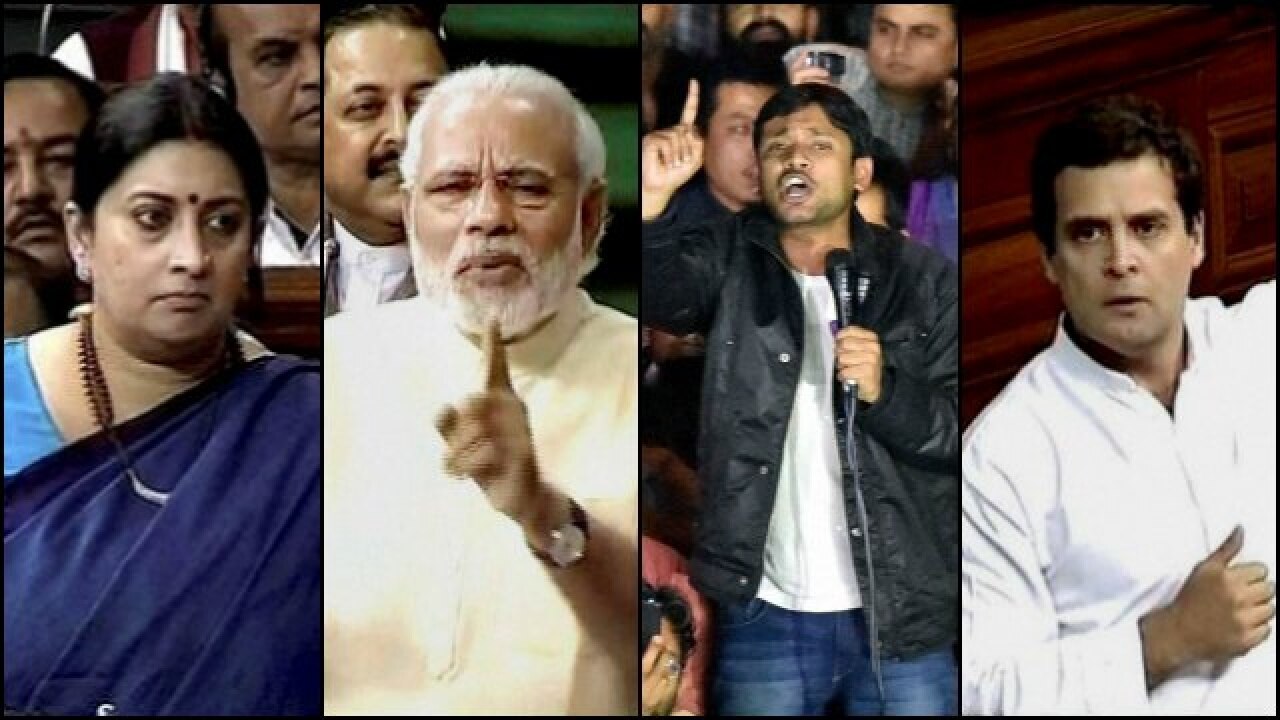
There were four speeches last week— three in Lok Sabha and one at JNU. The first was by Human Resources Development Minister Smriti Irani. The second was by Congress vice-president Rahul Gandhi. The third was Prime Minister Narendra Modi. The fourth was by Kanhaiya Kumar, the president of the JNU Students' Union after his release from Tihar Jail on interim bail. All of them demonstrated the low quality of India’s democratic discourse.Lok Sabha and one at JNU. The first was by Human Resources Development Minister Smriti Irani. The second was by Congress vice-president Rahul Gandhi. The third was Prime Minister Narendra Modi. The fourth was by Kanhaiya Kumar, the president of the JNU Students' Union after his release from Tihar Jail on interim bail. All of them demonstrated the low quality of India’s democratic discourse.
Irani did steal the show on the day she spoke on the developments at the Central University of Hyderabad and Jawaharlal Nehru University. But her thunder died as quickly because instead of relying on facts she chose to exaggerate and was loud. Loudness is not effective beyond a point. She did not clarify anything, and it is clear why she chose to be loud. When you do not have facts, then you have to shout.
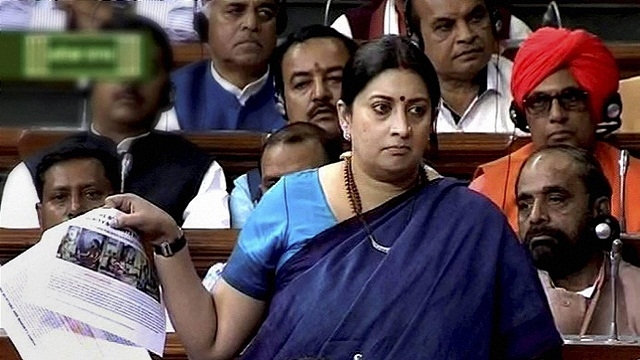
Then Rahul Gandhi spoke, participating in the Motion of Thanks to the President’s Address. He too chose to be loud, to be sarcastic, to be witty. He punched well and scored brownie points alright. But he did not show the gravity that a good politician should bring to his criticism of the government. He mocked the government on all counts. But mockery is not refutation.
Modi has been speaking in a moderate tone in the Parliament, in contrast to his public meetings and his campaign speeches. But, a roundabout way, he mocked the opposition, especially the Congress party, for not allowing the Parliament to function. Then he indulged in a bit of sermonising when he said that on March 8 only women members should be allowed to take the floor in the Parliament. He also said that there should be a day for first-time members to speak—and, of course, he clarified that he was not saying this because he was himself a first-timer—because they will give fresh ideas and that will be good for political discourse in the country. Then he blamed the opposition for its inferiority complex about the new programmes that the NDA government had brought in. He said that this game of envy of “my shirt is whiter than yours” should not be the theme of opposition’s criticism. So he criticised the MNREGA as introduced by the UPA and how his government was trying to make it more effective. Then, to counter the criticism of his Make in India programme, he quoted Indira Gandhi’s 1968 speech where she says that the educated class in India has this habit of finding reasons as to why something cannot be done.
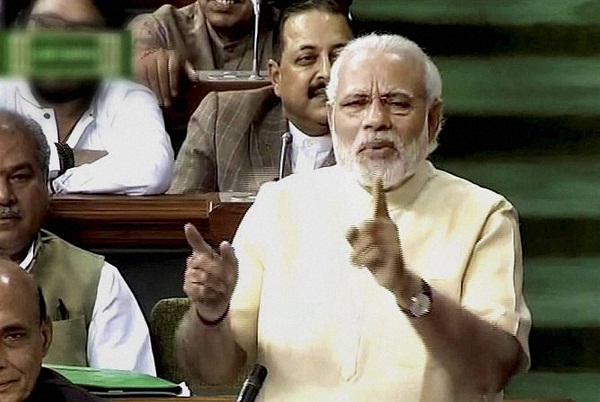
Out of the blue, PM Modi then quoted Khrushchev’s denunciations of Stalin and gave a version of how a student got up and confronted Khrushchev as to what he was doing when he was with Stalin. Apparently, Khrushchev had said that now the student could stand up to ask the question and still survive. This was not so in Stalin’s time. The other version of the story is that when he heard the question, he bellowed, “Who is it?”, and when there was no answer he said that was his position as well. The PM seems to imply that even though he is in a position of power now, he was willing to face criticism and would not silence critics even though he can do so. This is a rather ominous sign if that is what he has in mind. Or, alternatively, he seems to say that during Congress' rule no one could question the leader, but now they can. This looks quite far-fetched because the Congress was under fire from all sides when it was in power. Or, did he have a premonition that Kanhaiya Kumar would be launching an attack against him the same evening?
The newspaper headlines on Modi’s speech were misleading. He cited Nehru and Indira Gandhi only to mock Congress, not to reach out to the main opposition party. He made it quite clear that there was no need for him to take the criticism from the Congress seriously.
Kanhaiya Kumar’s speech, which floored many people, was juvenile and there was nothing surprising about it. A student union leader, however, cannot be expected to do anything better when a Union minister, an opposition party vice president and the Prime Minister himself are unable to say anything meaningful.
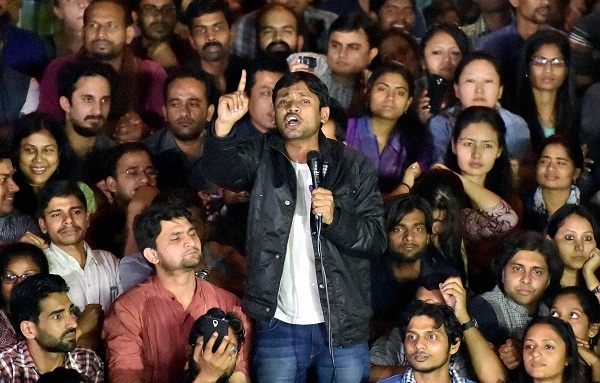
More than Kanhaiya Kumar’s speech, it is the speeches of Irani, Gandhi and Modi that should be cause for concern. Irani was reckless in imparting emotional overtones to the issue of student unrest in two universities. She did not display the maturity and sense of responsibility expected of a minister in the Union government. Gandhi’s speech was disappointing because it was puerile in the quality of its criticism of the government. Biting one-liners are welcome but the speech cannot be a string of one-liners. It lacked a sense of seriousness.
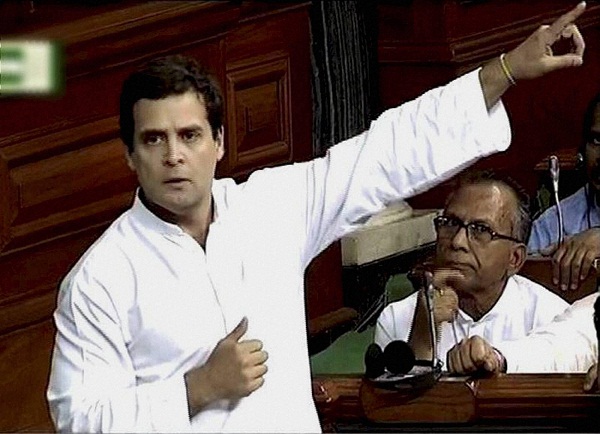
Congress has to recognise that it has been voted out of office and that as a party in opposition it can point out drawbacks in the government’s policies but it cannot become a roadblock. The reason that it has won as few as 44 seats is a clear indication that the people have not given it a mandate to obstruct government’s business.
Modi cannot hope to become a good politician if he sympathises with himself for having endured being a target of criticism and abuse for more than a decade, and then pats himself on the back for the good work that he is doing. This Uriah Heep act of Modi does not become the prime minister of a country.
He also needs to desist from sermonising and expecting the Parliament to be a college debating society. The opposition is not there to give him suggestions and ideas to run the government. He must learn to take criticism on the chin and respect the criticism. Indira Gandhi had this problem. She could not take criticism. It is not surprising that Modi looks to Indira Gandhi to ward off criticism.